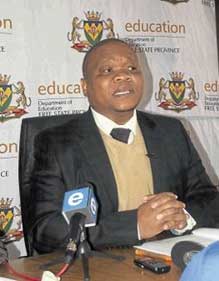
In the past year, following the launch of its schools-focused campaign, Corruption Watch has received hundreds of reports containing allegations of corruption in public schools from all over the country. Most of these have come from the Free State.
Ronald Menoe, Corruption Watch's campaigns and stakeholder relations manager, who presented the findings to the department's delegation, said he was satisfied with how the team was received. "One reason for approaching the provincial department was for Corruption Watch to build good relations, and work with them and not against them."
The point was to support the work of the department in eradicating corruption from its schools, he explained. "Because we have limited powers, we cannot take punitive action against employees of the department who are found guilty of corruption. We can, however, work together with the department so that it can achieve its goal of ridding its schools of corruption."
According to Corruption Watch, the most cases of corruption in schools are reported from schools in the public sector. According to its report, the objectives of the schools campaign are:
- To raise awareness of matters affecting policy and expose gaps in relation to the management of funds in schools;
- To support access to information and knowledge about the management of school funds; and,
- To raise awareness among the youth with the intention of shifting attitudes and encouraging them to resist corruption.
Ways that corruption is manifested in schools include :
- Financial mismanagement, which involves the misappropriation of funds and lack of adequate accounting of the use of finances, disregard for processes and a lack of financial reporting to parents and other members of the school governing body. In most reports, a combination of these activities is detailed.
- The reports on the theft of funds and goods indicate that there are two key assets that are being exploited: food associated with nutritional programmes and bank accounts.
- Whistle-blowers flag manipulation and flouting of regulations around the acquisition of goods and services. Details ranging from overinflated invoices to preferential suppliers and signing of blank cheques for goods that are never acquired are presented in the reports.

